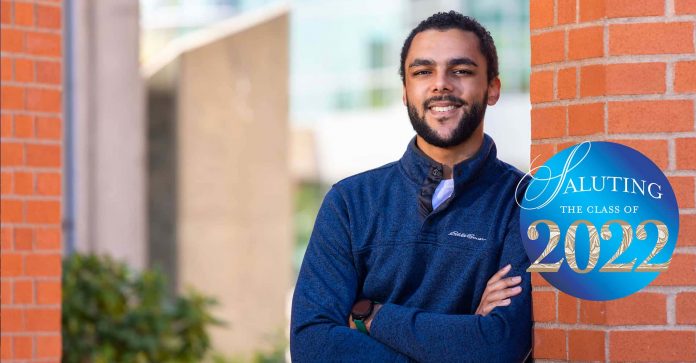On a micro level, senior Kaleb Roman, ’22, is making significant scientific strides in his research, teaching, and learning.
Using nanotechnology to create a cleaner energy source, Roman conceived of a battery that’s increasingly environmentally friendly for his honors thesis project.
“It’s a very marketable skill to be able to work with the instrumentation [here at Southern],” said Roman. “Being able to interact with those materials is very cutting-edge.”
Roman, a student in the Honors College majoring in physics and education with a minor in mathematics and transdisciplinary studies, is preparing to graduate with the Class of 2022 at the Total Mortgage Arena in Bridgeport, Conn., on May 20.
Spending time at a young age with his grandfather, an engineer, sparked Roman’s passion for pursuing physics.
“I had always been interested in science, and done well in school in that subject,” said Roman. “He would always teach me about math and engineering principles, and we would work on mechanics together. Once I took physics in high school, I knew that’s what I wanted to do.”
When touring Southern as a prospective student, Roman said what drew him to the institution was a personal tour of the Physics Department and the “individualized approach” by professors, which he could see would foster his love for the field.
“I had heard of some of the scholarships I could apply for here, as well as the Honors College,” said Roman. “I felt like I could connect with the professors here on a one-to-one basis. They gave me a full ride, so it was an easy decision from there.”
At times, a fair share of academic challenges came his way – for instance, managing clubs and organizations’ responsibilities, jobs, and a rigorous class regimen, all under the umbrella of the COVID-19 pandemic. Roman credits Adjunct Professor of Physics Thomas Sadowski for helping him through those difficulties.
“I had never been one to reach out for help,” said Roman. “We were able to get on the same page, and are still friends today.”
It was Sadowski who then recommended Roman to the Industry Academic Fellowship (IAF) Program. Sponsored by the Werth Family Foundation, the IAF provides undergraduate and graduate students with the opportunity to conduct team-based interdisciplinary research, including in the field of nanotechnology.
“Nanomaterials are huge right now,” said Roman. “Being able to incorporate those into technologies, specifically, is really big right now.”
According to previous data by the National Nanotechnology Initiative, more than 6 million nanotechnology jobs were needed by 2020, and the field continues to expand with the incorporation of STEM in primary/secondary schooling, as well as applications in higher education classrooms.
“All of the projects [in the Industry Academic Fellowship] have to do with environmental, conservation, and sustainability,” Roman said.
His project and thesis involved the creation of a supercapacitor, a battery that can hold 10 to 100 times more energy per unit than the average capacitor. A supercapacitor accepts and delivers a charge that is must faster than an average battery and has more charge and recharge cycles than a rechargeable battery.
In modern applications, supercapacitors are used in cellphones, laptops, and solar power. In Roman’s case, renewable materials would be used instead of a traditional chemical battery.
According to Roman’s research, his advanced supercapacitor would use a nanocomposite electrode called biochar-Mn02, a naturally derived conductor and recyclable material. He concluded that biochar-Mn02 serves as an effective electrode and a nanomaterial that is less harmful to the environment, as well as a point of research that can be brought into his classrooms.
“Being able to reference that in physical science and chemistry has been helpful in talking about real-world applications such as crystal structure and material property,” Roman explained.
Presently, he is completing his role as a student-teacher at Conard High School in West Hartford. He found his passion for teaching after tutoring as a junior and senior in high school.
“I’ve been enjoying it. I knew Southern was a great school for its education,” he said. “Finally getting out to the classroom, teaching, and connecting with students has been really rewarding. The teaching program is top-notch.”
Physics Professor Christine Broadbridge, Roman’s advisor and executive director of research and innovation at Southern, praises his growth as a researcher, student and teacher.
“His research within the Center for Nanotechnology on energy storage devices has already resulted in conference presentations, an honors thesis, as well as education modules that he is currently using in his student teaching,” said Broadbridge. “He has achieved teacher-scholar status as an undergraduate and his potential for future success is without limit.”
**********
The CSCU Center for Nanotechnology strives to foster collaborative, interdisciplinary research and educational initiatives/programs in micro-and nanotechnology to enhance Connecticut’s workforce competitiveness in nanotechnology and materials science. Currently, Southern offers a graduate certificate in Physics Nanotechnology.


